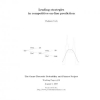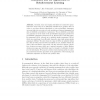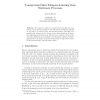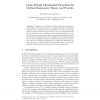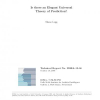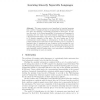111
click to vote
ALT
2006
Springer
15 years 5 months ago
2006
Springer
A number of natural models for learning in the limit is introduced to deal with the situation when a learner is required to provide a grammar covering the input even if only a par...
137
click to vote
ALT
2006
Springer
15 years 5 months ago
2006
Springer
In this paper the sequential prediction problem with expert advice is considered when the loss is unbounded under partial monitoring scenarios. We deal with a wide class of the par...
ALT
2006
Springer
15 years 11 months ago
2006
Springer
108
click to vote
ALT
2006
Springer
15 years 11 months ago
2006
Springer
We address the problem of reinforcement learning in which observations may exhibit an arbitrary form of stochastic dependence on past observations and actions. The task for an age...
ALT
2006
Springer
15 years 11 months ago
2006
Springer
136
click to vote
ALT
2006
Springer
15 years 11 months ago
2006
Springer
Abstract. Recently, some non-regular subclasses of context-free grammars have been found to be efficiently learnable from positive data. In order to use these efficient algorithms ...
101
click to vote
ALT
2006
Springer
15 years 11 months ago
2006
Springer
Abstract. We propose a method of unsupervised learning from stationary, vector-valued processes. A low-dimensional subspace is selected on the basis of a criterion which rewards da...
107
click to vote
ALT
2006
Springer
15 years 11 months ago
2006
Springer
Abstract. We propose a thresholded ensemble model for ordinal regression problems. The model consists of a weighted ensemble of confidence functions and an ordered vector of thres...
ALT
2006
Springer
15 years 11 months ago
2006
Springer
132
click to vote
ALT
2006
Springer
15 years 11 months ago
2006
Springer
This paper presents a novel paradigm for learning languages that consists of mapping strings to an appropriate high-dimensional feature space and learning a separating hyperplane i...

